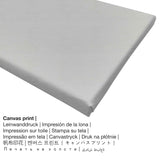Franz Dobiaschofsky, 1850 - Duke Ernst the Iron saves Cymburgis of Masovia - fine art print
inkl. MwSt. zzgl. Versandkosten
Art product information
Duke Ernst the Iron saves Cymburgis of Masovia was by Franz Dobiaschofsky. The over 170 year-old original has the following dimensions: 110 x 83 cm - frame: 137 × 111 × 11,5 cm. Oil on canvas was applied by the artist as the technique for the work of art. This artpiece belongs to the Belvedere's digital art collection located in Vienna, Austria. This artwork, which is in the public domain is provided with courtesy of © Belvedere, Vienna, inventory number: 9608. Furthermore, the artpiece has the following creditline: purchase from private property, Goslar / Germany in 2001. Besides, the alignment is portrait and has a ratio of 3 : 4, which means that the length is 25% shorter than the width. The painter Franz Dobiaschofsky was an artist, whose style was primarily Romanticism. The artist was born in 1818 in Vienna and died at the age of 49 in 1867 in Vienna.
Pick your product material variant
In the dropdown lists next to the product offering you can pick your individual size and material. Choose among the following product options now to match your preferences in size and material:
- Canvas print: A printed canvas mounted on a wooden frame. A canvas makes the exclusive impression of three dimensionality. The great advantage of canvas prints is that they are relatively low in weight, which implies that it is quite simple to hang up your Canvas print without additional wall-mounts. Therefore, a canvas print is suited for any kind of wall.
- Aluminium dibond print: Aluminium Dibond prints are metal prints with an impressive effect of depth. The Aluminium Dibond Print is the excellent introduction to the sophisticated world of art replicas on aluminum. For your Direct Aluminium Dibond option, we print the selected artpiece right onto the surface of the white-primed aluminum composite. The colors of the print are bright and vivid, details of the print are very clear, and there’s a matte look you can literally feel.
- Poster on canvas material: Our poster is a UV printed canvas paper with a granular finish on the surface. Please note, that depending on the absolute size of the canvas poster print we add a white margin of approximately 2-6cm round about the print motif, which facilitates the framing.
- Acrylic glass print: The acrylic glass print, often referenced as a print on plexiglass, transforms your favorite original artwork into gorgeous décor. Further, it offers a good alternative option to canvas and dibond fine art replicas. The work of art will be manufactured with the help of state-of-the-art UV print machines. The image effect of this are and vivid colors. The major advantage of an acrylic glass art print is that sharp contrasts and also minor artwork details become more identifiable with the help of the very fine tonal gradation of the print. The real glass coating protects your selected fine art print against light and heat for many years to come.
Disclaimer: We try everything in order to depict the products as accurately as possible and to showcase them visually on the different product detail pages. However, the pigments of the print materials and the printing can diverge marginally from the presentation on your screen. Depending on the settings of your screen and the condition of the surface, not all color pigments are printed as exactly as the digital version on this website. Because the fine art prints are printed and processed manually, there may as well be minor differences in the exact position and the size of the motif.
The product
| Article type: | art reproduction |
| Reproduction: | digital reproduction |
| Production method: | digital printing |
| Origin of the product: | German-made |
| Stock type: | production on demand |
| Intended usage: | home design, wall décor |
| Orientation of the image: | portrait format |
| Image ratio: | 3 : 4 length to width |
| Interpretation of the image aspect ratio: | the length is 25% shorter than the width |
| Available material choices: | canvas print, poster print (canvas paper), metal print (aluminium dibond), acrylic glass print (with real glass coating) |
| Canvas print (canvas on stretcher frame) variants: | 30x40cm - 12x16", 60x80cm - 24x31", 90x120cm - 35x47", 120x160cm - 47x63" |
| Acrylic glass print (with real glass coating) size options: | 30x40cm - 12x16", 60x80cm - 24x31", 90x120cm - 35x47", 120x160cm - 47x63" |
| Poster print (canvas paper) options: | 30x40cm - 12x16", 60x80cm - 24x31", 90x120cm - 35x47" |
| Aluminium print sizes: | 30x40cm - 12x16", 60x80cm - 24x31", 90x120cm - 35x47" |
| Art print framing: | please bear in mind that this reproduction does not have a frame |
Structured information on the artwork
| Title of the artpiece: | "Duke Ernst the Iron saves Cymburgis of Masovia" |
| Artwork classification: | painting |
| Category: | modern art |
| Century: | 19th century |
| Artpiece year: | 1850 |
| Artwork age: | 170 years old |
| Medium of original artwork: | oil on canvas |
| Artwork original dimensions: | 110 x 83 cm - frame: 137 × 111 × 11,5 cm |
| Museum: | Belvedere |
| Museum location: | Vienna, Austria |
| Web page: | Belvedere |
| Artwork license type: | public domain |
| Courtesy of: | © Belvedere, Vienna, inventory number: 9608 |
| Creditline of artwork: | purchase from private property, Goslar / Germany in 2001 |
Artist overview
| Name: | Franz Dobiaschofsky |
| Professions of the artist: | painter |
| Classification: | modern artist |
| Styles: | Romanticism |
| Died at the age of: | 49 years |
| Birth year: | 1818 |
| Born in (place): | Vienna |
| Died: | 1867 |
| Deceased in (place): | Vienna |
This text is copyrighted ©, Artprinta (www.artprinta.com)
Artwork specifications as provided from the museum (© Copyright - by Belvedere - www.belvedere.at)
We are in 1412 in the forests of Poland. The Hapsburg Duke Ernst the Iron (1377-1424) had traveled to the court of Krakow, where he wanted to woo the beautiful Cimburgis († 1429). Before he could carry out his plan, he went hunting and met just at the moment when she is attacked by a bear the king's daughter. He killed the animal and disappeared, without mentioning his name. It was not until the next day, on the occasion of a tournament, he stopped for the hand of Cimburgis. From this matrimony later Emperor Frederick III comes. Dobiaschofsky is one of the most important historical painter of the 19th century. The intensity in its image statement is based on a sophisticated people director, which he enriched with genre-like elements. This rare presentation illustrates a poem by Maximilian Fischel from the year 1812. [Sabine Grabner 8/2009]














